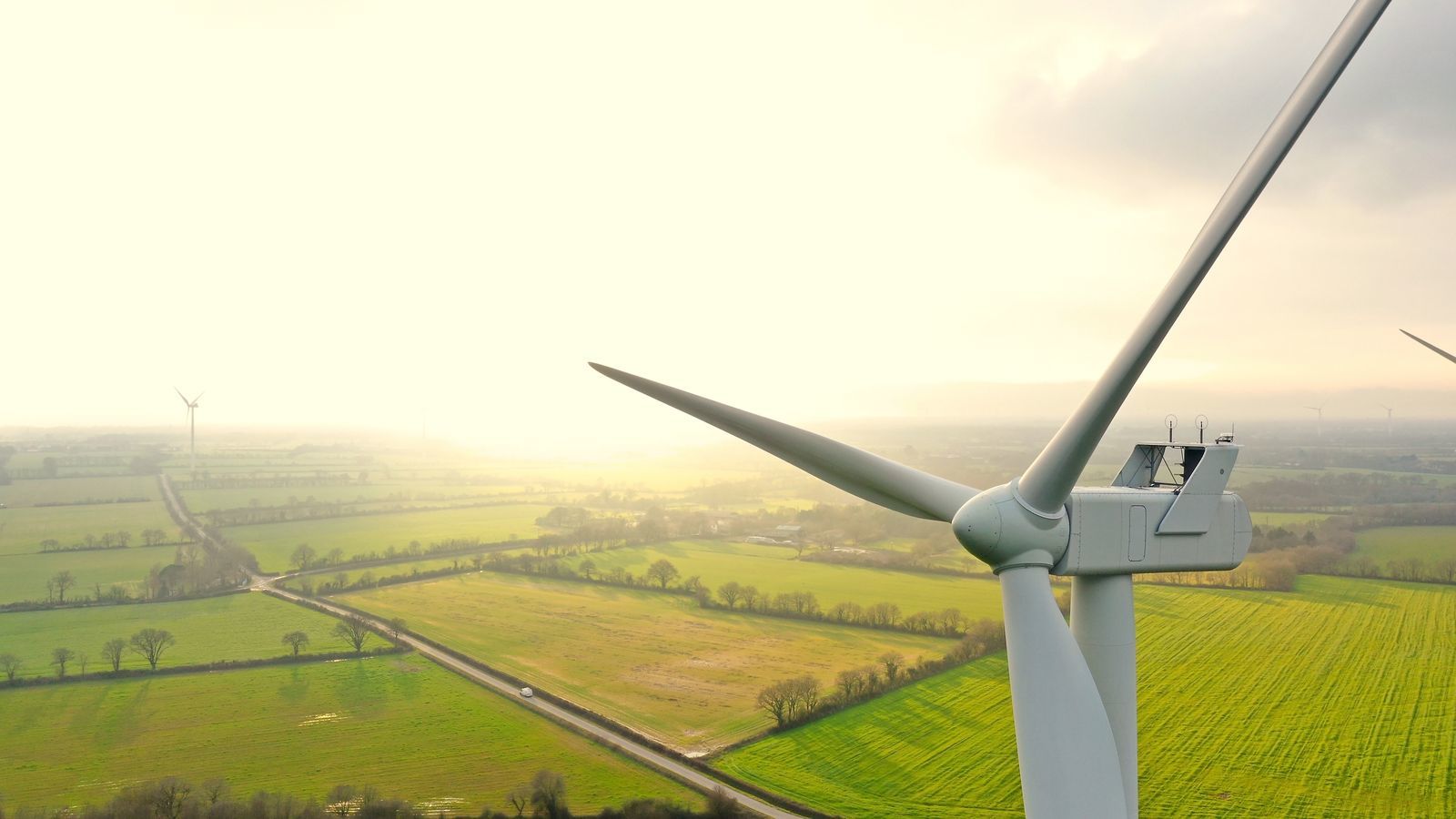
Britons paying hundreds of millions to turn off wind turbines as network can't handle the power they make on the windiest days
UK consumers are paying hundreds of millions of pounds to turn wind turbines off because the grid cannot deal with how much electricity they make on the windiest days.
The energy regulator Ofgem has told Sky News it is because the grid is "not yet fit for purpose" as the country transitions to a clean power system by 2035.
The National Grid Electricity System Operator (ESO), which is responsible for keeping the lights on, has forecast that these "constraint costs", as they are known, may rise to as much as £2.5bn per year by the middle of this decade before the necessary upgrades are made.
The problem has arisen as more and more wind capacity is built in Scotland and in the North Sea but much of the demand for electricity continues to come from more densely populated areas in the south of the country.
In order to match supply and demand, the National Grid has to move electricity from where it is being made to where it is needed.
But at the moment there aren't enough cables between Scotland and England to do that.
There is one major undersea cable off the west coast of the UK, and two main junctions between the Scottish and English transmission networks on land.
This bottleneck means that when it is very windy there is actually too much electricity for these cables to handle without risking damage.
And because we can't store excess renewable energy at the necessary scale yet, the National Grid Electricity System Operator has no option but to ask wind generators to turn off their turbines.
According to analysis by energy technology company Axle Energy, using publicly available data from the electricity system's balancing market platform Elexon, in 2022 the National Grid spent £215m paying wind generators to turn off, reducing the total amount generated by 6%, and a further £717m turning on gas turbines located closer to the source of demand, in order to fill the gap.
These costs are eventually passed to UK consumers as part of the network costs section on energy bills.
 Campaigners say the UK is squandering 'really cheap power'
Campaigners say the UK is squandering 'really cheap power'
Constraint costs are not just restricted to clean, cheap wind power.
In order to balance the system, the National Grid pays fossil fuel generators to ramp production up and down when necessary too.
But there is a particular focus on the impact of increasing levels of variable renewable generation and how that can be best managed.
'A huge risk - and a waste'
Director of policy for the renewable industry group RenewableUK, Ana Musat, told Sky News her members have been calling for upgrades to the grid for years.
She is now concerned the lack of transmission capacity may jeopardise the government's promise to decarbonise power generation by 2035 and get to net-zero carbon emissions by 2050.
She said: "It's a huge risk. We're wasting power instead of exporting it or using it and this is really cheap power that we're wasting.
"And I would also say as an investment signal, it's not great.
"If you think about a developer that wants to build wind farms in the UK, they know that it's not easy to connect to the transmission system, they know there's not enough capacity.
"So it's a really huge non-financial barrier that we're seeing and it's a big deterrent."
The energy department and Ofgem recognise the problem.
They recently set out joint plans to "overhaul" underwater and onshore transmission networks to connect up to 50GW of offshore wind to the grid by 2030, including two new undersea cables between Scotland and England that have already been approved.
But in a statement to Sky News an Ofgem spokesperson admitted the grid was not yet "fit for purpose".
They said: "Consumers must not pay the price for any foot dragging on net zero.
"Our transmission and distribution networks are not yet fit for purpose in getting secure, affordable and cleaner electricity to every part of the country.
"That's why we're investing in and overhauling electricity networks so we reach net-zero power at the lowest cost to consumers.
"We're speeding up planning reforms and regulatory approvals to increase network capacity rapidly.
"We're doubling investment by 2028 in expanding local grids to handle millions of new electric vehicles and heat pumps - plus improving energy security by increasing electricity storage; stripping out network congestion and stronger connections with other countries."
 Ofgem admitted 'transmission and distribution networks are not yet fit for purpose'
Ofgem admitted 'transmission and distribution networks are not yet fit for purpose'
The National Grid ESO has set out plans for a £50bn 'Holistic Network Design' that would connect more wind power to the grid by 2030.
But it also has to manage congestion on the grid using the infrastructure that exists, and is already working on schemes to reduce costs around the transmission bottleneck between Scotland and England.
In a statement they told Sky News: "As Great Britain's electricity system operator, we operate the system in the most cost effective way for the consumer, keeping capital costs as low as possible.
"Like many system operators across the world we make constraint payments when it is more economical to temporarily reduce wind output, for example, than build expensive new infrastructure.
"We constantly analyse constraint costs versus the building of new assets and are working with industry to reduce the impact of network constraints whilst building a greener system.
The Department for Energy and Net Zero is also increasing funding and encouraging private investment in grid scale battery storage and the development of green hydrogen production using excess renewable energy, as well as delivering more nuclear power to help compensate for the variability of renewable power.










